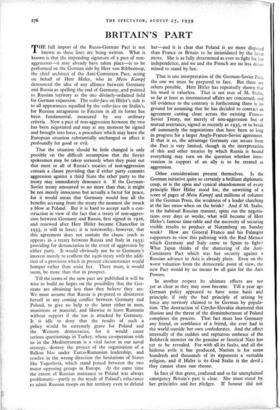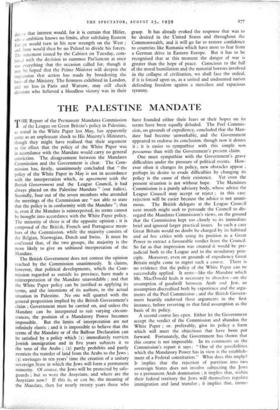BRITAIN'S PART
THE full import of the Russo-German Pact is not known as these lines are being written. What is known is that the impending signature of a pact of non- aggression—it may already have taken place—is to be performed on the German side by Herr von Ribbentrop, the chief architect of the Anti-Comintern Pact, acting on behalf of Herr Hitler, who in Mein Kampf denounced the idea of any alliance between Germany and Russia as spelling the end of Germany, and pointed to Russian territory as the one divinely-ordained field for German expansion. The volte-face on Hitler's side is to all appearances equalled by the volte-face on Stalin's, for Russian antagonism to Fascism in all its forms has been fundamental, measured by any ordinary criteria. Now a pact of non-aggression between the two has been negotiated and may at any moment be signed and brought into force, a procedure which may leave the European situation substantially unchanged or affect it profoundly for good or evil.
That the situation should be little changed is only possible on the difficult assumption that the Soviet spokesmen may be taken seriously when they point out that most or all of Russia's treaties of non-aggression contain a clause providing that if either party commits aggression against a third State the other party to the treaty may immediately denounce it. If the German- Soviet treaty amounted to no more than that, it might be not merely innocuous but actually a factor for peace, for it would mean that Germany would lose all the benefits accruing from the treaty the moment she struck a blow at Poland. But it is hard to accept such a con- struction in view of the fact that a treaty of non-aggres- sion between Germany and Russia, first signed in 1926, and renewed after Herr Hitler became Chancellor in 1933, is still in force; it is noteworthy, however, that this agreement does not contain the clause (such as appears in a treaty between Russia and Italy in 1933) providing for denunciation in the event of aggression by either party. It would obviously not be to Germany's interest merely to reaffirm the 1926 treaty with the addi- tion of a provision which in present circumstances would hamper rather than assist her. There must, it would seem, be more than that in prospect.
Till the terms of the new pact are published it will be wise to build no hopes on the possibility that the Ger- mans are obtaining less than they believe they are. We must assume that Russia is prepared to disinterest herself in any coming conflict between Germany and Poland, to give no help to the latter either in men, munitions or material, and likewise to leave Rumania without support if she too is attacked by Germany. It is idle to deny that the results of such a policy would be extremely grave for Poland and the Western democracies, for it would cause serious questionings in Turkey, whose co-operation with us in the Mediterranean is a vital factor in our naval strategy, destroy the project of the organisation of a Balkan bloc under Turco-Rumanian leadership, and resolve in the wrong direction the hesitations of States like Yugoslavia, which stand poised between the two major opposing groups in Europe. At the same time the extent of Russian assistance to Poland was always problematic—partly as the Desult of Poland's reluctance to admit Russian troops on her territory even to defend her—and it is clear that Poland is no more disposed than France or Britain to be intimidated by the latest move. She is as fully determined as ever to fight for her independence, and we and the French are no less deter- mined to stand by her.
That is one interpretation of the German-Soviet Pact, the one we must be prepared to face. But there are others possible. Herr Hitler has repeatedly shown that bis word is valueless. That is not true of M. Stalin, so far at least as international affairs are concerned, and till evidence to the contrary is forthcoming there is no ground for assuming that he has decided to contract an agreement cutting clean across the existing Franco- Soviet Treaty, not merely of non-aggression but of mutual assistance, signed as recently as 1935, or to break off summarily the negotiations that have been so long in progress for a larger Anglo-Franco-Soviet agreement. If that is so, the advantage Germany can secure from the Pact is very limited, though in the interpretation of this and other treaties by which Russia is bound everything may turn on the question whether inter- vention in support of an ally is to be treated as aggression.
Other considerations present themselves. Is the German initiative quite so certainly a brilliant diplomatic coup, or is the open and cynical abandonment of every principle Herr Hitler stood for, the unwriting of a score of pages of Mein Kampf and millions of columns in the German Press, the weakness of a leader clutching at the last straw when on the brink? And if M. Stalin, in the habitual Russian manner, spins out the negotia- tions over days or weeks, what will become of Herr Hitler's famous time-table and the necessity of securing visible results to produce at Nuremberg on Sunday week? How are General Franco and his Falangist supporters to view this paltering with the Red Menace which Germany and Italy came to Spain to fight? What Japan thinks of the shattering of the Anti- Comintern Pact which was her security against a Russian advance in Asia is already plain. Even on the worst valuation from the democratic point of view, the new Pact would by no means be all gain for the Axis Powers.
In another respect its ultimate effects are not yet as clear as they may soon become. Till a year ago German policy appeared to have some basis and principle, if only the bad principle of seizing by force any territory claimed to be German by popula- tion. The destruction of Czecho-Slovakia shattered that illusion and the threat of the dismemberment of Poland completes the process. That fact must lose Germany any friend, or semblance of a friend, she ever had in the world outside her own confederates. And the effect internally of the sudden and rapturous embrace of the Bolshevik monster on the genuine or fanatical Nazi has yet to be revealed. For with all its faults, and all the hideous evils it has produced, Nazism is for some hundreds and thousands of its exponents a veritable religion, and if Hitler is its God Stalin is the devil ; they cannot share one throne.
In face of that grave, confused and so far unexplained emergency Britain's part is clear. She must stand by her principles and her pledges. If honour did not dict,te that interest would, for it is certain that Hitler, who.e ambition knows no limits, after subduing Eastern Europe would turn in his new strength on the West ; and there would then be no Poland to divide his forces. The statement issued by the Cabinet on Tuesday, com- bined with the decision to summon Parliament at once was everything that the occasion called for, though it may be hoped that the Prime Minister will deepen the impression that action has made by broadening the basis of the Ministry. The firmness exhibited in London, and no less in Paris and Warsaw, may still check dictators who believed a bloodless victory was in their grasp. It has already evoked the response that was to be desired in the United States and throughout the Commonwealth, and it will go far to restore confidence to countries like Rumania which have most to fear from a German drive in Eastern Europe. But it has to be recognised that at this moment the danger of war is greater than the hope of peace. Conscious to the full of the moral humiliation and the material horrors involved in the collapse of civilisation, we shall face the ordeal, if it is forced upon us, as a united and undaunted nation defending freedom against a merciless and rapacious tyranny.









































 Previous page
Previous page